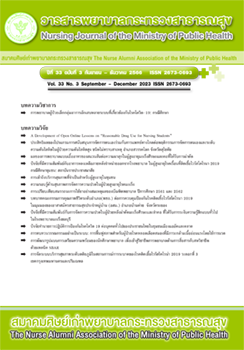A Comparison of the Competency in Rational Drug Use of Nursing Graduates between Academic Years B.E. 2561 and 2562
Main Article Content
Abstract
This descriptive study aimed to evaluate the competency in rational drug use of nursing graduates in academic year B.E. 2562 and to compare the competency in rational drug use of nursing graduates between academic years B.E. 2561 and 2562. The samples were nursing graduates who graduated in academic years B.E. 2561 and 2562 from 86 nursing education institutions. The instrument was a questionnaire on competency in rational drug use of nursing students. The data were analyzed using descriptive statistics and t-tests. The results showed that nursing graduates in academic year B.E. 2562 had all RDU competencies at a high level. Correct administration of medication according to prescription was the highest competency (Mean=4.45, SD=.50). The competency to select the appropriate medication according to need was rated lowest (Mean=4.33, SD=.54). Rational drug use competency of nursing graduates in academic years B.E. 2562 was higher than that n academic years B.E. 2561 at a significant level of p<.05. It is suggested that nursing education institutes and the Thailand nursing and midwifery councils should continuously organize teaching and learning activities that promote learners' rational drug use e to improve awareness, knowledge, and skill for rational drug use.
Article Details

This work is licensed under a Creative Commons Attribution-NonCommercial-NoDerivatives 4.0 International License.
บทความและรายงานวิจัยในวารสารพยาบาลกระทรวงสาธารณสุข เป็นความคิดเห็นของ ผู้เขียน มิใช่ของคณะผู้จัดทำ และมิใช่ความรับผิดชอบของสมาคมศิษย์เก่าพยาบาลกระทรวงสาธารณสุข ซึ่งสามารถนำไปอ้างอิงได้
References
Herliani YK, Harun H, Setyawati A, Rifa’atul Fitri SU. Knowledge of rational use of medicine among nursing students. The Indonesian Journal of Public Health 2022;17(2):230-40.
World Health Organization. Medicines: rational use of medicines. Fact sheet No.338 May 2010.
Health Systems Research Institute and Coordination and Integration Committee on Antimicrobial Resistance. Thailand national strategic plan on antimicrobial resistance 2017-2021 [Internet]. 2017 [cited 2020 Apr 30]. Available from: https://rr-asia.woah.org/wp-content/uploads/2020/03/thailand_thailands-national-strategic-plan-on-amr-2017-2021.pdf
World Health Organization. Rational use of medicines. Fact sheet no.38 [Internet]. 2010 [cited 2010 Mar 20]. Available from: www.who.int/mediacentre/factsheets/fs338/en
Vaismoradi M, Jordan S, Vizcaya-Moreno F, Friedl I, Glarcher M. PRN medicines optimization and nurse education. Pharmacy 2020;8:201.
Rational Use of Drug Subcommittee. Teacher’s guide for promoting rational drug use. Nonthaburi: Food and Drug Administration, Ministry of Public Health; 2017.(in Thai)
Thailand Nursing and Midwifery Council. The handbook of learning and teaching management on rational drug use in the bachelor of nursing science program. Chonburi: Danex Intercoperation; 2019.(in Thai)
Chankunapas P, Boonyarit P, Srisupan W, Leungruaengrong P, Prapaso N. Service plan: rational drug use. Nonthaburi: Public Sector Development Group, Health Administration Division, Office of the Permanent Secretary, Ministry of Public Health; 2016.(In Thai)
Srisa-ard B. Introduction to research. 10thed. Bangkok: Suveeriyasarn; 2560.(In Thai)
Charoensuk S, Leungratanamart L, Reunreang T, Turner K, Theinpichet K. An evaluation of competency in rational drug use of nursing graduates. Journal of The Royal Thai Army Nurses 2020;21(2): 158-168.(in Thai)
Turner K, Suwannapong K, Putthikhan P, Charoensuk S, Radabutr M, Angsirisak N, et al. Evaluation of the integrated model of the rational drug use into the bachelor of nursing science program in Thailand: A mixed-methods study. Belitung Nursing Journal 2021;7(6):485-89.
Polsingchan S, Rungruan K. Selected factors affecting rational antibiotic use behaviors of nursing students at Boromarajonani College of Nursing, Surin. NJPH 2021;31(1),211-23.
ÖZATİK FY, BABAOĞLU ÜT, ÖZKARAMAN A, YİĞİTASLAN S, EROL K. The knowledge and attitude of nursing students from school of health towards rational drug use 2019;41(4):315-25.
Putthikhan P, Suwannapong K, Angsirisak N, Turner K, Theinpichet S. An evaluation of the policy of integrating RDU curriculum into the bachelor of nursing science program and RDU competency of nurse instructors. Thai Red Cross Nursing Journal 2020;13(1):282-301.
Thadakant S, Hu SH, Duangbubpha S, Changpad T, Pibanwong M. Medication administration errors of nursing students during practice in clinics and simulation. Rama Nurs J 2022; 28(2):282-98.mmunication 2016;21(sup2):54-60.
Bunmusik S, Chantra R, Heeaksorn C. Knowledge attitude and behaviors in rational antibiotics use of nursing students Southern College of Nursing and Public Health Network. Journal of Health Research and Innovation 2019;2(1):25-36.
Sornkrasetrin A, Thongma N, Rajataramya B. Factors predicting the rational antibiotic use among nursing students. The Journal of Baromarajonani College of Nursing, Nakhonratchasima 2019;25(1):43-59.
Khan Z, Karatas Y, Martins MAP, Jamshed S, Rahman H. Knowledge, attitude, practice and barriers towards pharmacovigilance and adverse drug reactions reporting among healthcare professionals in Turkey: a systematic review. Current medical research and opinion 2022;38(1):145–54.

